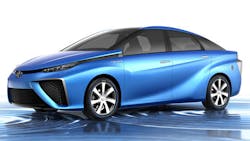TOKYO, May 8, 2014 (AFP) - Driven by a recovery in major markets and the weaker yen, Toyota (IW 100/8) booked a record $17.9 billion annual net profit Thursday, but the world's biggest automaker cautioned that earnings growth would stall this year.
Japanese car companies have been big winners over the past year as a sharp drop in the yen inflated their repatriated profits, while sales accelerated in key markets including the U.S. and China.
Toyota's buoyant results underscore a recovery not only for the Camry and Corolla maker but also for rival auto giants including Nissan and Honda, which saw its net profit in the past fiscal year soar about 55%. Nissan reports its annual financial results next week.
On Thursday, Toyota said it had earned a net profit of 1.82 trillion yen (US$17.9 billion) over the fiscal year to March, nearly doubling from a year earlier, as sales rose 16.4% to 25.69 trillion yen.
Toyota's operating profit jumped to 2.29 trillion yen, from 1.32 trillion yen.
Company president Akio Toyoda credited cost cuts and stronger sales in Japan and North America for the results as Toyota looks to sell more than 10 million vehicles in 2014, an industry record.
But he cautioned that this fiscal year's net profit would come in lower at 1.78 trillion yen, as Toyota eyes "sustainable growth."
"We're determined not to target an unreasonable expansion that is beyond our capacity," he said.
"Our goal is to achieve sustainable growth. The biggest risk is the kind of arrogance that big companies tend to have...Profit is not an objective, but rather a consequence."
Toyota kept the title of world's biggest automaker with 2013 sales of 9.98 million vehicles, outpacing Germany's Volkswagen and General Motors, and said it expects this calendar year to become the first to break the 10 million vehicle sales barrier.
Not so Rosy
Toyota ended GM's decades-long reign as the world's top automaker in 2008 but lost the crown three years later as Japan's quake-tsunami disaster hammered production and disrupted the supply chains of the nation's automakers.
Toyota has also been dealt a heavy blow from a series of mass recalls affecting millions of cars that damaged its once-stellar reputation for quality and safety.
Japanese automakers' sales in China fell off a cliff in late 2012 and into last year as a Tokyo-Beijing diplomatic row sparked a consumer boycott of Japanese brands in the world's biggest vehicle market.
Relations remain tense, but Japanese manufacturers have reported sales are returning to pre-spat levels.
While Toyota has ramped up its drive to tap emerging markets, analysts pointed to Japan's April sales tax hike -- which could dent consumer spending -- and unrest in Thailand as possible headwinds.
About half of Toyota's latest net profit was due to the weak yen.
"The road ahead is not so rosy", cautioned Shigeru Matsumura, analyst with SMBC Friend Securities.
"The positive impact of the weak yen is fading, while the sales tax hike is likely to hurt sales in Japan," he said.
"Business in emerging economies is also getting tougher as customers demand better quality at low prices. There are some risks on the labor side too."
Toyota was hit by a strike at a production complex in southern India with employees returning to work last month after a five-week standoff.
That came weeks after Toyota recalled 6.39 million vehicles globally over a string of problems, while it also agreed to pay $1.2 billion to settle U.S. criminal charges that it covered up a sticky pedal blamed for dozens of deaths.
Other Japanese automakers have suffered from damaging recalls while General Motors has said its bottom line suffered owing to a $1.3 billion charge for the recall of seven million vehicles worldwide.
"Quality control is a really important issue," said Matsumura at SMBC Friend Securities.
"Automakers are now using a lot of common parts, which could trigger a huge recall once problems come up."
Toyota is among a host of major Japanese firms to announce their first domestic wage hikes in years. The automaker is also boosting its dividend and has announced plans to buy back about $3.5 billion of its shares as calls grow for the firm to unlock a huge cash war chest.
- Shingo Ito, AFP
Copyright Agence France-Presse, 2014
About the Author
Agence France-Presse
Copyright Agence France-Presse, 2002-2025. AFP text, photos, graphics and logos shall not be reproduced, published, broadcast, rewritten for broadcast or publication or redistributed directly or indirectly in any medium. AFP shall not be held liable for any delays, inaccuracies, errors or omissions in any AFP content, or for any actions taken in consequence.
